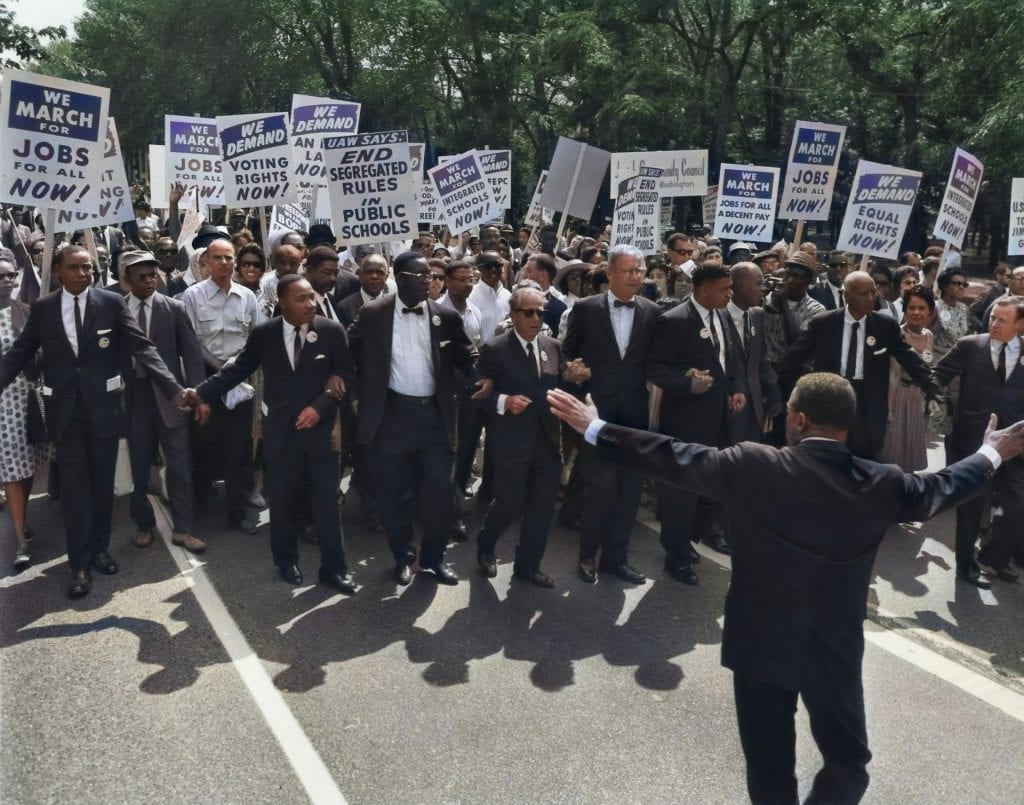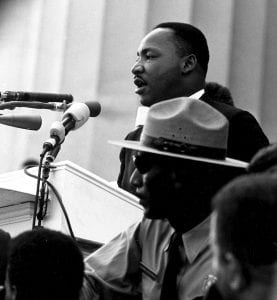
Lyndon B. Johnson Library, Public Domain
“We live at a time when the world is full of violence, oppression and conflict.” “We live in a time of deep division in our own country.” Perhaps both these statements are true of many times, maybe even all times, but they are certainly true of this one. The communication technologies of our period also can serve to make these realities seem closer to us or harder for many of us to escape, even if we’d like to.
One of the reasons we honor and celebrate certain special individuals is because we hope that in their lives, we can find wisdom and inspiration for our own times. In the span of a few weeks at the beginning of the year, we mark the birthday of Martin Luther King, Jr., the celebration of Foundation Day (the commemoration of the start of the Vincentian Mission), and the birthday of Abraham Lincoln. So much could be said about each of these days and the men and the movements they commemorate. Today, let’s consider what they might suggest to us about relationship and dialogue in difficult times.
In reading the highly acclaimed new biography of Dr. King by Jonathan Eig (who happens to live near DePaul’s Lincoln Park campus), I was struck by King’s relationship with President Lyndon B. Johnson. Johnson reached out to King three days after the assassination of President Kennedy seeking his assistance.[1] Johnson was a highly skilled political operator and said he was committed to civil rights but he knew he needed the help of King, who was then at the height of his mainstream popularity and success. They remained in close contact although neither publicized their dialogue, and both were wary of the other. (In fact, both knew that elements of the federal government were spying on King and seeking to destroy him.) King wept after watching Johnson’s powerful address to Congress after the civil rights movement was met with violence in Selma (and after Johnson had met in the White House with Alabama’s segregationist governor George Wallace).[2] The address called Congress and the nation to pass the Voting Rights Act. Despite what they were able to accomplish in this arena, as Johnson continued to escalate the Vietnam War, King would not remain silent, despite the advice of many who considered themselves his allies in the movement.[3]
In his famous “Letter from a Birmingham Jail,” King stressed the importance of dialogue and negotiations (along with research to identify injustices and to engage in self-purification). Yet King rejected the idea that direct action was in opposition to dialogue and negotiations. King argued that while destructive violence must always be opposed, the constructive tension created by nonviolent direct action was often necessary to force those in power to engage in dialogue and negotiations with the marginalized. King said that while he initially disliked being the label of extremist, he now embraced the need for “creative extremists” for love, truth, and justice.[4]
While the time and place of Vincent was not one of direct action or of democracy, I would argue that Vincent and the organizations he founded relied not only on service, but also on creative calls through words and actions for those in power to accept their responsibility for those on the margins. The call for the powerful in France to live up to the Christian example and not ignore those in poverty stood in stark contrast to the injustices of French society. When Vincent was transformed from a smart young man who was motivated to make a better life for himself to one utterly committed to serving God and those living in poverty, he did not cut off relationships with the elite and powerful in society. Instead, he continued to cultivate them with the aim of using those relationships to fulfill his mission.
I have also been reading a compelling recent book on Abraham Lincoln by NPR’s Steve Inskeep.[5] While Lincoln, like King, is remembered for his powerful oratory, this book focuses on Lincoln’s relationships and dialogues. Each chapter focuses on a different account of encounters between Lincoln and another person who came from a different background than him and with whom he had a significant disagreement. What stands out in each encounter is Lincoln’s willingness to engage with those with whom he disagreed. The results of the dialogue were rarely about one convincing the other, but Lincoln used the dialogues to understand others better. He was a quintessential politician and believer in democracy, and he could use his understanding of the others’ interests to define priorities and create coalitions to accomplish his most important goals. Although as a politician Lincoln would often choose to remain strategically silent as part of this process, Inskeep’s book takes its title from something Lincoln wrote in a letter to his close friend Joshua Speed. Speed came from a slaveholding family and Lincoln “chided [him] for admitting the “abstract wrong” of slavery but failing to act accordingly.”[6] Still, Lincoln remained in relationship with Speed, signing off the letter with “your friend forever.”[7]
We all have different roles to play in life and in the university. Just as the roles and perspectives of a prophetic preacher leading a movement for social change, a politician in an era of civil war, and a saintly founder of a religious order in an absolute monarchy may differ greatly, we may see our own roles differently based on our positions, personalities, or other commitments. I see in each of these examples a call to remain in dialogue and relationship with others, even those with whom I may have profound differences or disagreements. I have seen a call to sincerity in that dialogue which means a willingness to express difficult truths and to listen to them. Finally, I appreciate the role that constructive, creative tension can play in individual and communal transformation when we are willing to channel that tension into dialogue and negotiation.
I am inspired by the people and spaces in the university that help form students to engage in these types of difficult, sincere ongoing dialogues. Among those with which I am most familiar are the Interfaith Scholars program and the Grace School of Applied Diplomacy, but I know there are many others. What are the ways in which you think DePaul engages these questions best and what are ways in which we might be able to do better?
REFLECTION BY: Abdul-Malik Ryan, Muslim Chaplain and Assistant Director, Office of Religious Diversity, Division of Mission and Ministry.
[1] Jonathan Eig, King: A Life (New York: Farrar, Straus and Giroux, 2023), 351.
[2] Ibid., 435.
[3] Ibid., 514–30.
[4] See Martin Luther King, Jr., “Letter from a Birmingham Jail,” August 1963, https://www.csuchico.edu/iege/_assets/documents/susi-letter-from-birmingham-jail.pdf.
[5] Steve Inskeep, Differ We Must: How Lincoln Succeeded in a Divided America (New York: Penguin Press, 2023).
[6] Ibid., xiv-xv.
[7] Ibid., xv.

